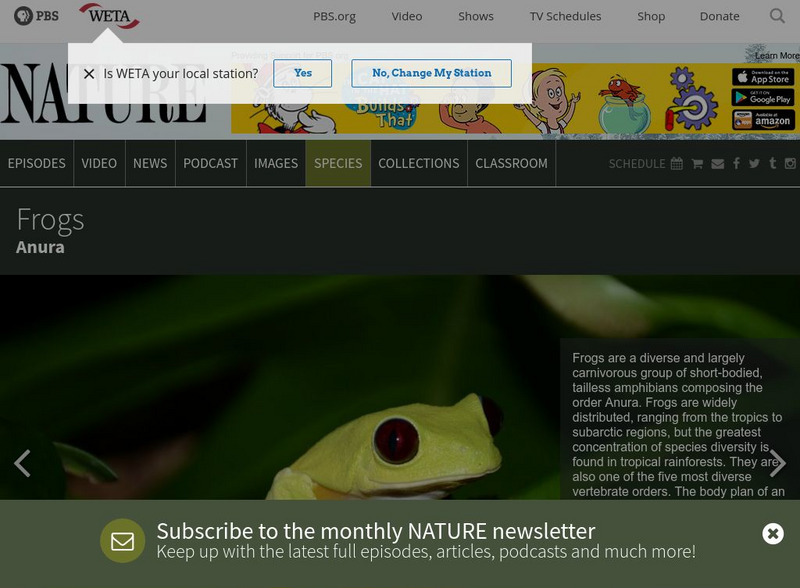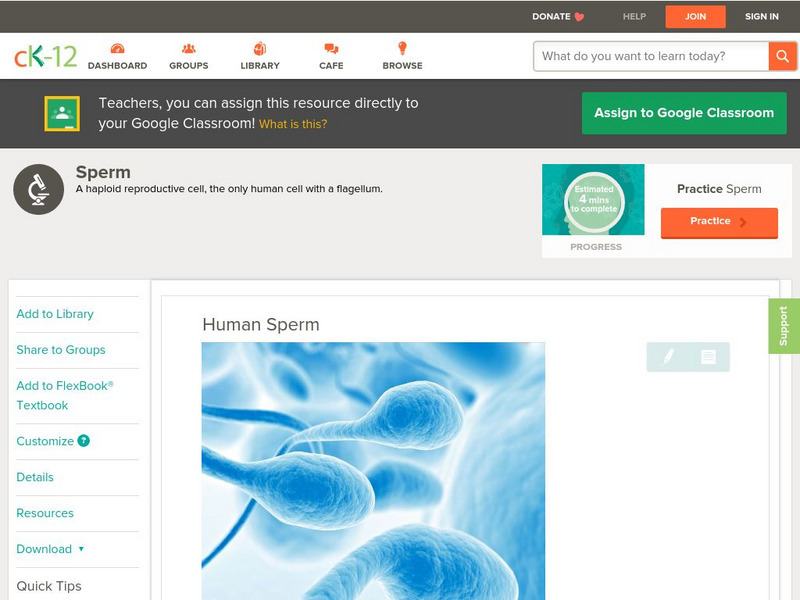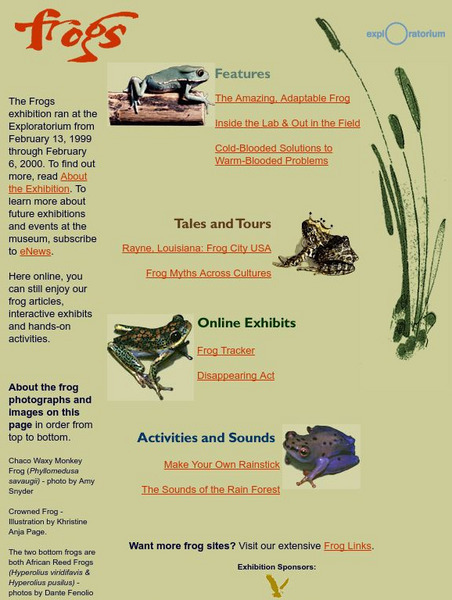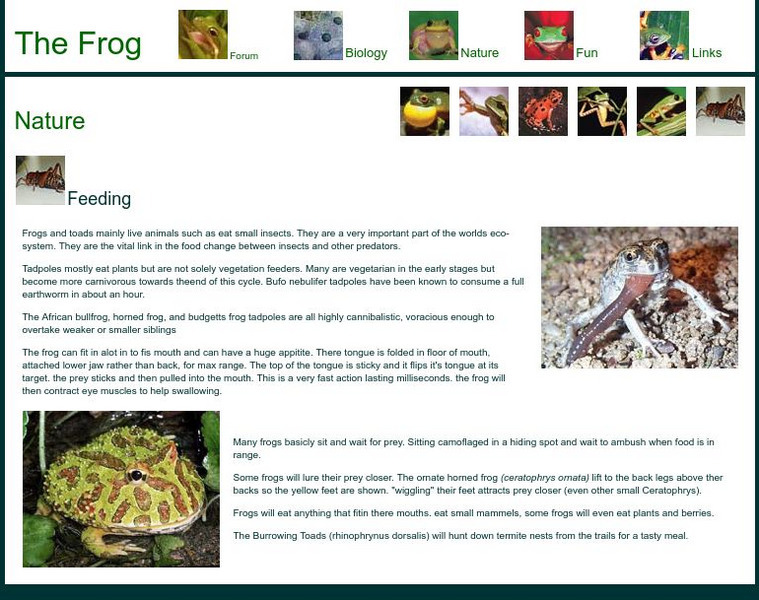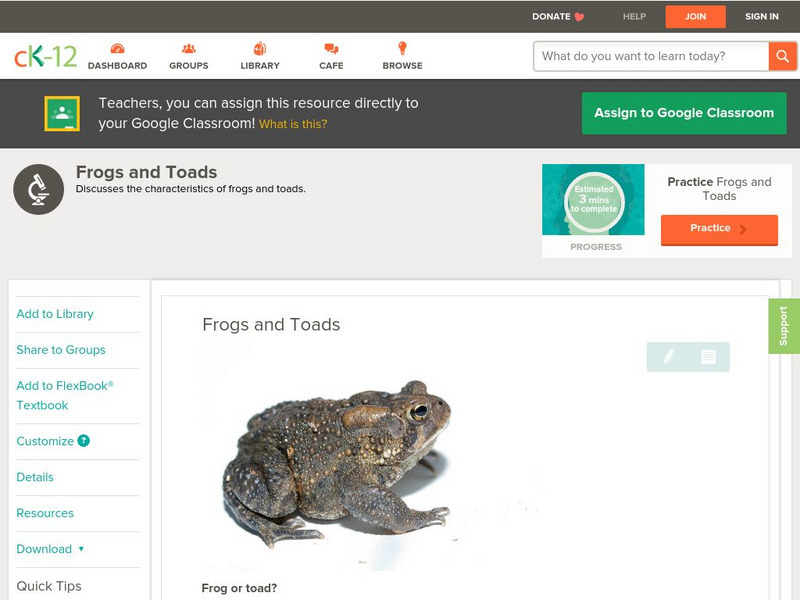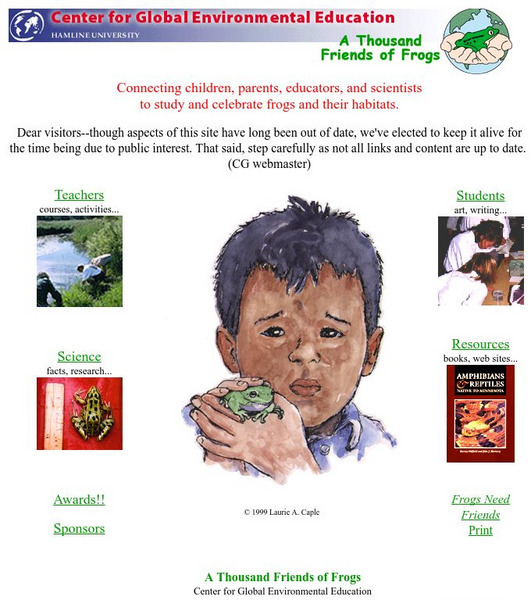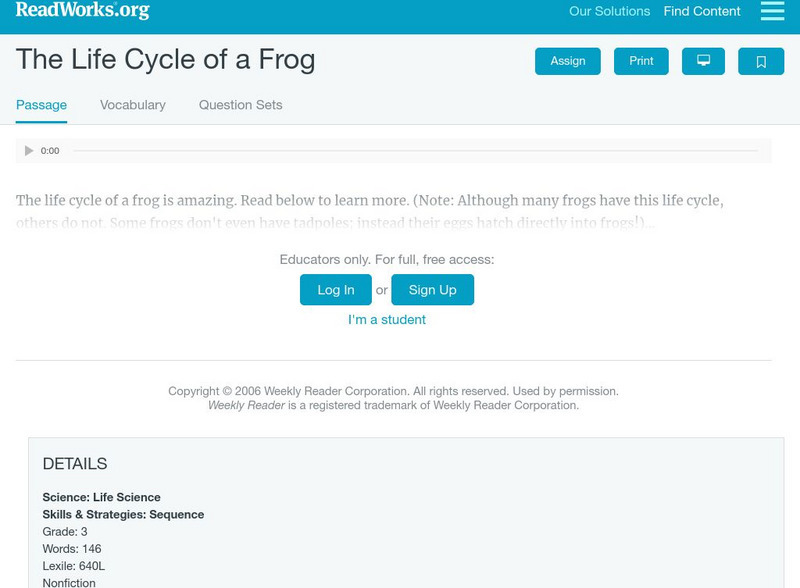Alabama Learning Exchange
Alex: Tad the Tadpole
Tad the Tadpole is designed to demonstrate how pollution in various areas affects wildlife in their native habitats. The lesson is designed to stress the importance of conservation for animals and their surrounding environment. Upon...
Other
All About Frogs: Life Cycle of a Frog
Understand the reproduction and life cycle of a frog from mating through spawn, eggs, tadpoles, and growing legs to the final frog. Nice details.
University of Guelph
Canada's Aquatic Environments: Reproduction
A three-page introduction to reproduction in amphibians can be found at this site. Read about the various methods of reproduction, and what happens after the eggs are laid. There is also a section that shows the growth/development stages...
PBS
Pbs Teachers:costa Rica: Why So Many Frogs?
Explore the different stages in the growth of a frog, explain why organisms produce large numbers of young and determine the survival rate of a population of tadpoles under controlled conditions.
Other
The Somewhat Amusing World of Frogs
Find out what you don't know about frogs, frogs vs. toads, frog size, sight, environment, legs, mouth, food, color, defense, tadpoles, and more.
Alabama Learning Exchange
Alex: Leap Into the Life Cycle of a Frog
During this lesson young scholars explore the life cycle of a frog. They will raise frogs in the classroom from tadpoles and document and describe each stage of the life cycle.
PBS
Pbs Nature: Frogs and Toads
Do you know how to tell the difference between a frog and a toad? This site provides interesting facts and information about this type of amphibian from where they live to what they eat and more.
Ducksters
Ducksters: Amphibians for Kids: Frogs, Salamanders, and Toads
What is an amphibian? Kids learn about these cold blooded animals including salamanders, frogs, and toads. Lifecycle such as tadpole and metamorphosis.
Other
Tooter4kids: Life Cycle of Frogs
The life cycle of the frog is presented in an easy to read format. A simple diagram of the cycle is included.
Environmental Education for Kids
Eek!: Amphibians
Amphibians are cold-blooded, smooth-skinned vertebrates. Most live some of their life in water and some on land. The most common amphibian critter is a frog but there are many others. Read about Wisconsin's many amphibians here.
CK-12 Foundation
Ck 12: Life Science: Human Sperm
[Free Registration/Login may be required to access all resource tools.] Sperm, the male reproductive cells, are tiny. In fact, they are the smallest cells in the human body. Some people think that they look like tadpoles. Learn more...
Exploratorium
Exploratorium: The Amazing Adaptable Frog
Journey back over a million years ago and see how the common frog has adapted and changed.
Exploratorium
Exploratorium: Frogs
The Exploratorium museum in San Francisco provides this exhibit companion site that features information about frogs including their habitats, characteristics, calls, and much more. Instructions are included for making a rain stick.
Natural History Museum
Natural History Museum: Reptiles, Amphibians and Fishes
This online exhibit from the Natural History Museum branches out in many fields to cover the broad topics of reptiles, amphibians and fishes. Thirteen subtopics are provided including several videos and informative articles.
Other
The frog.org: Feeding
TheFrog.org provides information about the lives of frogs. This particular page discusses the diet of a typical frog.
CK-12 Foundation
Ck 12: Life Science: Frogs and Toads
[Free Registration/Login may be required to access all resource tools.] Frogs and toads are amphibians in the order Anura. In terms of classification, there is actually not a big difference between frogs and toads. Learn more about frogs...
Enchanted Learning
Enchanted Learning: Frogs
Frog rhymes, crafts, diagrams, and facts are available for students, teachers, and parents from Enchanted Learning.
Other
Center for Global Environmental Education: A Thousand Friends of Frogs
An in-depth site about the world of frogs. The site includes teacher, student, science, and research sections. There are plenty of facts and activities.
Read Works
Read Works: The Life Cycle of a Frog
[Free Registration/Login Required] An informational text about the steps in a frog's life cycle. A question sheet is available to help students build skills in reading comprehension.
Math Science Nucleus
Math/science Nucleus: Frog Poem Animation
This animation outlines the life of a frog in a storybook format through a poem. The poem covers the stages in the life of a frog.
ClassFlow
Class Flow: Frogs
[Free Registration/Login Required] This flipchart is a brief introduction to frogs, their habitats, life cycle, and some fun facts!
Other
Springboard Magazine: The Circle of Life
A brief explanation of life cycle is provided along with pictoral respresentations of three different examples of life cycles (apple tree, butterfly and frog). The term metamorphosis is introduced and the resouce has an interactive...
Curated OER
Pocket Frog
Find out what you don't know about frogs, frogs vs. toads, frog size, sight, environment, legs, mouth, food, color, defense, tadpoles, and more.
Curated OER
[Toads Mating]
Understand the reproduction and life cycle of a frog from mating through spawn, eggs, tadpoles, and growing legs to the final frog. Nice details.
Other popular searches
- Tadpoles to Frogs
- Tadpoles Metamorphosis
- Life Cycle of Tadpoles
- Frogs and Tadpoles
- Frogs Growing Tadpoles
- Raising Tadpoles
- Biology Tadpoles
- Tadpoles for Pre K
- Ten Tiny Tadpoles
- Work Sheets Tadpoles
- Characteristics of Tadpoles
- Tadpoles Promise








